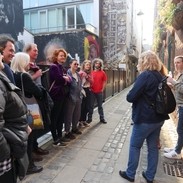Holiday packages
VisitBritain/Llio Angharad

Disclaimer
Disclaimer: While every effort has been made to ensure the accuracy of the information contained in the Pink Book, we regret that we cannot be responsible for any errors. The Pink Book contains general information about laws applicable to your business. The information is not advice and should not be treated as such. Read our full disclaimer.
Key facts
Note: the Department for Business, Energy and Industrial Strategy (BEIS) is currently reviewing the Package Travel and Linked Travel Arrangements Regulations 2018, and the following information could change as a result.
If you offer, or allow customers to buy, at least two of the following elements: transport, accommodation, vehicle hire and other significant visitor service, then you are probably subject to the Package Travel and Linked Travel Arrangements Regulations 2018.
These regulations cover circumstances where you sell different elements yourself, work with another business to sell different elements, or provide the customer with a targeted offer to purchase an element from another business.
These regulations include specific requirements relating to how you market, book and deliver these products.
Package Travel Regulations
The Package Travel and Linked Travel Arrangements Regulations 2018 (commonly known as the ‘Package Travel Regulations’) were introduced on 1 July 2018 and greatly expand the scope of the former Regulations. The main changes are that the Regulations now cover situations where the customer creates their own packages (dynamic packaging), and introduces the concept of a ‘Linked Travel Arrangement’, whereby a customer is provided with a targeted offer for a service provided by a separate business once they have completed a booking. These changes affect the activities of many accommodation providers.
These regulations concern the marketing, sale and performance of products that are sold together or through a linkage. They apply not only to large companies offering overseas package holidays, but also to accommodation businesses selling offers that combine or link products (for example, accommodation with tickets to an attraction, a spa treatment, a murder mystery weekend or a round of golf).
Enforcement and penalties
There are criminal penalties for non-compliance. Trading Standards are responsible for enforcing the legislation.
Do the regulations apply to me?
Yes:if you are offering a package of services for sale at an inclusive price which includes at least two of the services listed below, and the package lasts for at least 24 hours or includes overnight accommodation, you will probably be offering a ‘package’ that is subject to the regulations:
- Transport;
- Accommodation;
- Vehicle hire;
- Other visitor services that are a significant part of the package and not ancillary to transport or accommodation (for example excursions, access to a golf course and theatre tickets, but not educational, business or conference services).
Selling Packages
There are two main circumstances in which an accommodation business may be deemed to be selling a package:
1. You work with another business in order to provide a package that combines two or more elements. This is the traditional package, where two businesses work together to develop a package that is then sold to the customer for an inclusive price. For example, if you sell accommodation and a ticket to a nearby attraction for an inclusive price.
2. Your business sells two or more different elements to customers. This applies in situations where you sell different products to customers on your premises – for example, if you operate a hotel which provides accommodation and other services such as restaurant meals, spa treatments, gym use or a round of golf. This covers two different situations:
- Specific offers that your business puts together, such as a ‘romantic weekend package’ at a hotel which includes accommodation and a meal, or a ‘New Year’s Eve special’ which includes entrance to a party with the accommodation.
- Self-packaging by the guest where, either by phone or through your website, they book a room and another service such as a spa treatment or meal in the restaurant at the same time.
Note: a package is only formed if the different elements can be purchased separately. Therefore, bed and breakfast businesses are exempt because the price of the breakfast is always included in the room rate.
Exemptions
There are two main exemptions to the Package Travel Regulations for accommodation businesses:
1. If the ‘Other Tourism Service’ element does not form a ‘significant part’ of the package.
When the ‘Other Tourism Service’ element is combined with accommodation, a package is only deemed to have been formed if the ‘Other Tourism Service’ makes up ‘a significant part’ of the package.
What constitutes a ‘significant part’ of the package is a bit of a grey area, but there are two main tests:
- If the ‘Other Tourism Service’ constitutes over 25% of the cost of the package. This requirement provides accommodation businesses with the opportunity to review their pricing structure so that, where they provide a service alongside accommodation, the service is priced in such a way that it comprises under 25% of the overall cost to the customer, thus excluding the package from the regulations.
- If the ‘Other Tourism Service’ is deemed to be an ‘essential element’ of the package. It is important to note that even if the service is under 25% of the total cost, it could still be a ‘significant part’ of the package if it is deemed to be an essential element. This means that there is good reason to believe that the customer bought the package on the basis of this element. While this can be subjective, it is generally accepted that if the promotion of the package is based on the service, then it is an essential element, compared to where it is promoted as a ‘bonus’.
For example, if you sold a combination of accommodation and a round of golf as a ‘weekend golf break’, then the round of golf would be an essential element regardless of whether it represented over 25% of the total cost. However, if you simply said that use of a golf course was a benefit of staying at the hotel, this would probably not be deemed as an essential element.
2. If the elements are purchased at least 24 hours apart.
The other main exemption is that a package or Linked Travel Arrangement is not formed if the two different elements are purchased at least 24 hours apart.
For example, if a customer books both their accommodation and a table at your restaurant at the same time, this would constitute a package. However, if they booked the accommodation and then called back two days later to book a spa treatment, this would not be a package. Similarly, if your guests purchase a meal at your restaurant after they arrive, or you sell them tickets to a local attraction or a round of golf at the local golf club, provided that they booked the accommodation more than 24 hours before arrival, then this would also be outside the scope of the legislation.
What do the regulations require?
The regulations contain significant provisions relating to the marketing, booking and delivery of packages and Linked Travel Arrangements, including the terms and conditions of contracts for providing these products.
If you are deemed to be selling a package or Linked Travel Arrangement, there are also significant requirements on the information you must provide to the customer, the terms and conditions that must apply to the sale, and the financial protection that you must have in place. The specific requirements vary between packages and Linked Travel Arrangements, but the main features are:
1. Pre-contractual information
Before customers book the package, they must be provided with information on the main characteristics of the package (that is, what is included in the package and any exceptions, such as whether service charges are included or whether the offer of a meal includes drinks), the total price of the package, the name and details of the organiser and information on the cancellation policy.
2. Standard information about the Package Travel Regulations
The pre-contractual information must be accompanied by standard information forms that make customers aware of the key protections associated with buying a package holiday, including telling them if they are not covered by the regulations.
3. Contractual information
When the customer makes the booking, they must be provided with further information. This includes contact details if a problem is experienced during the course of the contract, the complaints resolution process, and the ability of the customer to transfer the booking.
4. Insolvency protection
You must have insolvency protection that covers all reasonable costs, including the return of all payments for services not performed and repatriation. This can be achieved through buying insurance, keeping customer payments in a trust account or becoming bonded.
Selling Linked Travel Arrangements
Separate from the rules related to the sale of packages, the regulations also address the sale of Linked Travel Arrangements. A Linked Travel Arrangement is deemed to have been formed if, on the basis of booking accommodation with you, the customer is provided with a targeted offer such as a discounted rate for purchasing something from another business, or access to facilities not generally available. This applies regardless of whether you gain financially from the arrangement. There are two forms of Linked Travel Arrangement:
Type A: This is where the customer, on completing a purchase on your website, is immediately invited to purchase another product on someone else’s site. For example, someone purchasing accommodation is immediately offered the opportunity to purchase a hire car on a partner’s website.
Type B: This is where you facilitate the customer purchasing additional services from another business, but that purchase does not take place within 24 hours of their booking with you. For example, if you provide the customer with a voucher to get 20% off a meal in a local restaurant when they arrive.
There has been confusion as to whether providing recommendations to customers on local businesses such as restaurants, pubs and attractions constitutes the creation of a Linked Travel Arrangement, but new Government guidance states that you are entitled to provide recommendations without this being deemed to be included in the scope of the legislation.
Further guidance
Your local Trading Standards office
Your local Trading Standards office can provide more information on the requirements of the Package Travel Regulations.
Government guidance
The Department for Business, Energy and Industrial Strategy (BEIS) provides guidance for tourism businesses on the application of the Package Travel Regulations. Although the guidance offers a good assessment of what constitutes a package, you should seek specific advice if you believe that you are selling packages or Linked Travel Arrangements as this remains a complex area.







